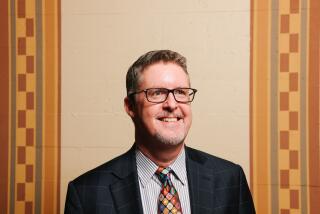August Fruge, 94; Publisher Transformed UC Press
- Share via
August Fruge, a longtime director of the University of California Press who broke new ground by expanding the book list beyond academic works to include titles about nature, history and literature for a broader audience, has died. He was 94.
Fruge had suffered two strokes and died July 6 at his home in Twentynine Palms, said Harlan Kessel, a friend and former colleague.
During Fruge’s years at the press, from the early 1940s through the late ‘70s, his colleagues came to call him the “Alfred Knopf of university press publishers” for the way he adopted techniques common to the commercial book business that were rarely used in his field.
Among his innovations was a paperback series. He also solicited manuscripts by authors not affiliated with the UC system and developed subject categories previously overlooked by the UC Press.
Several of the books Fruge acquired sold more than 1 million copies. Among them was “The Teachings of Don Juan: a Yaqui Way of Knowledge” (1968) by Carlos Castaneda, which became a cult classic. “Ishi in Two Worlds: A Biography of the Last Wild Indian of North America” (1961) established author Theodora Kroeber as a leading authority on Native American and Western history.
“August Fruge created the UC Press as we know it now,” Lynne Withey, the current director, told The Times last week. “He was a leader in changing the nature of the university press.”
Most of the categories he introduced reflected his personal interests, including Greek and Roman classics, Latin American studies, history and nature. The “California Natural History Guides,” a series he launched in 1959, came at a time when most natural history books featured Eastern geography. The series remains the largest and one of the most successful lists the UC Press publishes.
After becoming an active member of the Sierra Club in the early 1940s, Fruge strengthened the ties between the group and the UC Press. An avid hiker, naturalist and environmentalist, he served as chairman of the club’s publications committee starting in 1960.
Recalling his start in book publishing in 1944, Fruge described an academic venture with no commercial motives. About 90% of the publications were professors’ monographs. By the time he retired, the press was producing close to 200 books a year. At least half were geared to a general readership. Some, including the complete works, letters and papers of Mark Twain, appealed both to scholars and avid readers.
“A publisher’s job is entrepreneurial,” Fruge said in a 1997 interview for the oral history archive of the Bancroft Library at UC Berkeley. “Going out and finding a manuscript and getting it in shape to sell, [a publisher] is working between authors and the public, authors and salesmen.”
For his first 15 years on the job, the UC Press was considered an offshoot of a UC printing business.
“The publishing side was a little editorial operation carried on the back of the printing operation,” he recalled. Books were typeset when it was convenient for the printers. One manuscript, “The Story of Wine,” by food writer M.F.K. Fisher and landscape photographer Max Yavno, sat in his office for two years before it was printed in 1962. Fruge imposed a publishing schedule and a marketing strategy.
“I got ambitious,” he said of his plans. “I wanted to make the press much more of a publishing outfit. This threw us into conflict.”
To help accomplish his goal, Fruge opened a UC Press office at UCLA for the convenience of Southern California authors. He also established links with book publishers in Latin America to encourage the translation and distribution of Spanish-language works in the United States.
Few of his innovations were readily accepted. He advanced his views after skirmishes and battles. The heaviest fighting broke out in the early ‘60s, when he changed production techniques from Linotype to computer. The printers were against it; the editorial committee favored Fruge’s plan. His side won.
Other conflicts erupted when he added content editors to work with writers on the concept and crafting of their books. Previously, writers had submitted their manuscripts to copy editors to correct grammar, verify facts and handle formatting.
Fruge described his travails in one of his several books, “A Skeptic Among Scholars: August Fruge on University Publishing” (1953). Later, he said he had always entered the fray with low expectations.
“I’m a pessimist,” he said in his interview with the Bancroft Library. “My belief is that things aren’t going to go that well.”
Colleagues saw him differently. “Fruge was a realist,” said Kessel, director of marketing and editor of the paperback division of the UC Press when Fruge was director. “He was willing to tackle anything, but he knew that success was never guaranteed. He could deal with adversity. It takes a master to survive in his business, and he was one.”
Born in Wiser, Idaho, Fruge graduated from Stanford University and earned a master’s degree in library science at UC Berkeley. His first several jobs were in libraries. “Once I got to the Press, I was hooked,” he said in 1997.
He married Grete Wiese in 1938, and they had one son before they divorced. Subsequently he married Susan Haverstick, a founder of the California Native Plant Society for plant preservation and ecology programs. She died in 2001. Fruge remained an active member of the group.
He is survived by his son, John.
Donations in Fruge’s memory can be made to UC Press Associates, 2120 Berkeley Way, Berkeley, CA 94704, or to the California Native Plant Society, K Street, Suite 1, Sacramento, CA 95816-5113.
More to Read
Sign up for our Book Club newsletter
Get the latest news, events and more from the Los Angeles Times Book Club, and help us get L.A. reading and talking.
You may occasionally receive promotional content from the Los Angeles Times.










